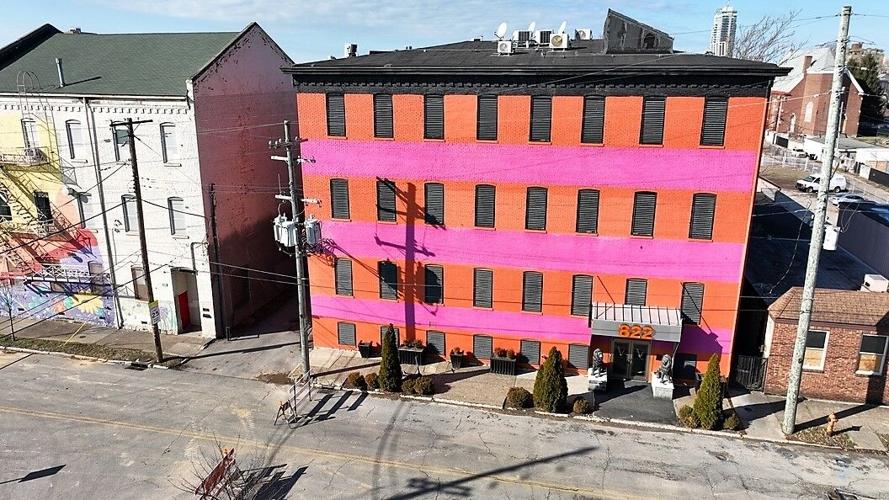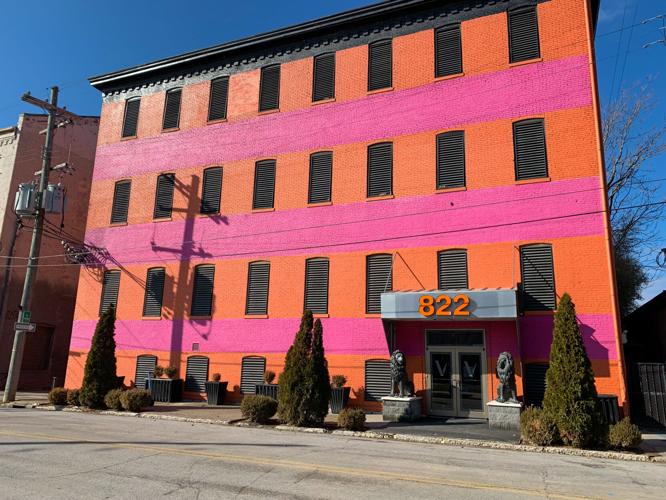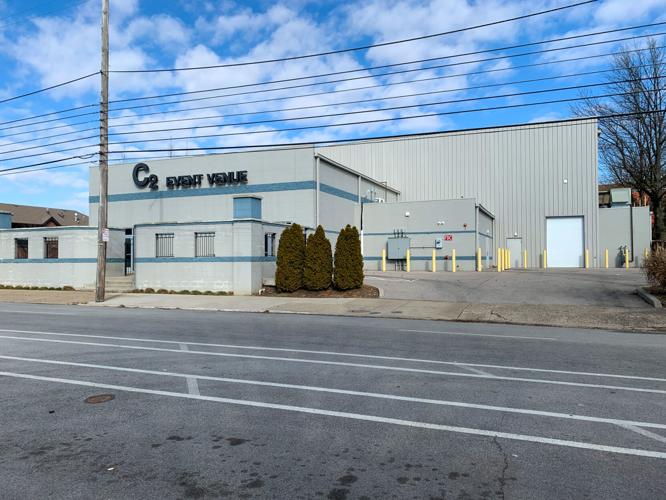LOUISVILLE, Ky. (WDRB) — The comprehensive homelessness plan Mayor Craig Greenberg announced Thursday involves Louisville Metro government spending millions of dollars to buy a Smoketown hotel and event center owned in part by a top contributor to Greenberg’s campaign, despite high-ranking city officials having expressed doubts over a year ago about those buildings’ suitability for homeless services.
Greenberg said Thursday that the city has reached an agreement to purchase the Vu Hotel, C2 Event Venue and ancillary buildings owned in part by developer George Stinson for $6.9 million.
The hotel, event venue and other buildings are off E. Breckinridge Street between S. Floyd and S. Brook streets, immediately south of the “Hope Village” safe outdoor camping space that the city stood up last year.
Stinson, a longtime Louisville businessman, donated the maximum $2,000 to Greenberg’s campaign last year, in addition to $1,000 in 2021 during the Democratic primary, according to public records.
Meanwhile, Stinson has been trying to sell the hotel and event center to the city for more than a year. Metro Council considered appropriating $7.5 million to buy it in late 2021, but walked away from the idea after top officials in former Mayor Greg Fischer’s administration expressed reservations.
To be sure, there are differences between what city officials originally considered in 2021 and the plan Greenberg laid out Thursday for a “Community Care Campus” spanning a whole block in Smoketown, such as a proposed “medical respite facility” championed by Louisville’s downtown hospitals.
Greenberg said Friday that he has “a very different plan” than what was originally considered for the Stinson properties.
But the history of the property seems to contradict a narrative that emerged Thursday of Stinson’s having selflessly agreed to sell the hotel and event center for a significant discount when pressed into service.
In his press conference Thursday, Greenberg said a group involving Norton Healthcare, University of Louisville Health and the Coalition for Homeless recommended the Stinson property following tours of “several properties around this community.”
“The recommendation came in to me. I called up George Stinson, who is the property owner. George is committed to this cause as well. We were very quickly able to reach an agreement,” Greenberg said Thursday.
“(W)hen approached to sell the properties, (Stinson) saw it as an opportunity to support ‘the overall good of the city,’” The Courier-Journal reported Thursday.
But in August 2021, Stinson sent a letter to all 26 Metro Council members advocating that the city buy the property for use in the homelessness crisis. He said he was offering “a turnkey operation.”
WDRB News obtained a copy of the letter, which Stinson acknowledged putting his name on, though he said he didn’t write it.
“Of course, when I invested millions of my own money to develop this property, I never envisioned the use I am proposing to you. But at this point, I think it makes sense. And I see that this is a once in a lifetime chance to make a big impact on a crisis affecting our city,” Stinson said in the letter to the council members.
In a phone interview Friday, Stinson said the city’s lack of initiative under Fischer resulted in Smoketown becoming “a nucleus for the homeless,” which “de-valued” his hotel and event center.
“It killed my project,” Stinson told WDRB News.
Stinson also acknowledged his business — like virtually all hotels — also suffered during the pandemic.
As for the campaign donations, Stinson said his support of Greenberg simply reflects his politics. “I’m a progressive liberal … Why does anyone give to a campaign?” he said.
Stinson has a history of donating to numerous Louisville-area Democrats since the late 1990s, according to the Kentucky Registry of Election Finance.
Stinson added that he is not the only one with an ownership interest in the hotel and event center property. Public records show Stinson’s longtime business partner, Ed D. Lewis, is also an owner.
Greenberg, for his part, told WDRB News that Stinson’s political support had “nothing to do” with his decision to purchase the hotel and event center.
Instead, it was the unanimous recommendation of a “medical working group” including people from Norton Healthcare, U of L Health and others who studied locations for “nearly a year.”
“It’s very close to medical facilities. It's close to other assets that the city owns that are currently already working on preventing homelessness and providing services and shelter to those who are in need,” Greenberg said. “It’s immediately adjacent to the Hope Village. So, for all of those reasons, this was the perfect place for it to be.”
Asked if he was aware of Stinson’s previous pitch to sell the property to the city, Greenberg said, “I was aware that there had been discussions between the city and George, yes. But I don’t know the details of those.”
Stinson offers property for sale
In the fall of 2021, after Stinson raised the prospect of Metro purchasing the hotel and event center, Fischer administration officials toured the site while hiring an appraiser to estimate its market value.
The October 2021 appraisals, which Greenberg’s team provided to WDRB News on Friday, confirm the collective value of Stinson’s property at $7.5 million. Seven appraisals were completed, as the site is split into many parcels.
In late 2021, Metro Council considered allocating $7.5 million from the city’s federal pandemic relief funds to purchase the property.
But the council shelved the idea after top Metro officials expressed reservations about repurposing the buildings for homelessness services, as well as a lack of a plan for funding renovations and operations.
“I don’t think that we collectively felt like it was a site for what we needed at this time,” Marilyn Harris, director of Develop Louisville, the city department that includes housing and community development, told the council budget committee on Dec. 9, 2021.
Speaking about the Vu Hotel, a boutique hotel built in 2016, Harris said: “The upgrades that would be needed would be significant considering the way that the property is laid out, as well as the finishes. So things like glass showers; the rooms have a glass-shower bath right in the middle of the room. That’s not going to work for this population.”
Nonetheless, Greenberg’s administration plans to use the four-story hotel for “family / individual housing,” according to a map released Thursday.
But Greenberg said his plan differs from what city officials contemplated in late 2021.
“As I understand it, the hotel was originally thought about being transformed into, like, a permanent housing shelter for those who are homeless. That's not what we're currently going to use that hotel building for now,” he said. “Now, because we have the whole property, we have another building that can serve that role. This (hotel) will be used as temporary housing to help get those who are homeless into permanent affordable housing.”
Other questions the council grappled with more than a year ago included what it would cost to renovate the Stinson properties and how the services provided there would be funded.
Jeff O’Brien, chief of Louisville Forward, the city’s economic development agency, told the council committee in 2021 that there were no estimates for the cost of renovations and that it was unclear whether a plan to capture funding via federal housing vouchers would fly.
Greenberg acknowledged uncertainty about what the city will have to spend on the community care campus, but he said his team is developing plans and moving quickly.
“I don't know those exact numbers yet. But we are hoping to do very minimal improvements, is our goal, so that we can open these properties up in connection with our medical partners,” he said.
‘We had to get what we could’
Metro Council member JeCorey Arthur, a Democrat who represents Smoketown and downtown, was among the council members who has asked skeptical questions about the Stinson property during the December 2021 hearing.
But in the year since Stinson pitched his property for sale, it’s become clear that no property in the city is better suited, Arthur told WDRB News on Friday.
“All the concerns are definitely still there. But because (Greenberg) was able to negotiate the price down, and because we really don't see any other options as far as purchasing a large building that we could convert into shelter space, we had to get what we could get,” Arthur said.
Riggs Lewis, a vice president of Norton Healthcare, was part of the group that evaluated sites along “the Interstate 65 corridor” where the homeless population tends to converge. Lewis confirmed that his group saw no better alternative to the Stinson properties.
“Finding something of scale was difficult. There either full hotels, unavailable, or open spaces that would take three years to build,” Lewis told WDRB News on Thursday. “The mayor said, ‘I am urgent to get this done’ — a sense of purpose. So this facility, according to every group that walked through it, met every goal — food service, housing, respite care, clinical care — and we can wrap around all the services on this campus so that people aren’t falling between the cracks.”
Metro Council member Brent Ackerson, a Democrat who represents parts of Jeffersontown and St. Matthews, proposed funding the purchase of the Stinson property in 2021.
Ackerson said he is glad the idea has been revived under Greenberg.
“What changed between now and then is we have a mayor that is working with the healthcare industry, because this is not only about a benefit to people that are homeless, but this is also about delivering health care services to those homeless people,” Ackerson said. “What’s changed is, you’ve got a mayor who actually understands building costs … It's about an administration recognizing a good use of money and moving pieces around the board for a better outcome.”

















